- Home
- J. T. Edson
Calamity Jane 10
Calamity Jane 10 Read online
The Home of Great Western Fiction!
There was a lot of bad feeling left over from the War between the States, and not only between the North and South. Britain had allowed Confederate navy ships to use her ports, and after that, there wasn’t much trust between them.
Belle Boyd, the Rebel Spy, now with the U.S. secret service, had discovered an anarchist plot to attack Canada from U.S. soil, and she knew it had to be stopped. She soon found an ally in the Remittance Kid—but the Kid was working for the British...
Could Belle really trust him...?
CALAMITY JANE 10: THE REMITTANCE KID
By J. T. Edson
First published by Corgi Books in 1978
Copyright © 1978, 2020 by J. T. Edson
First Digital Edition: June 2020
Names, characters and incidents in this book are fictional, and any resemblance to actual events, locales, organizations, or persons living or dead is purely coincidental.
All rights reserved. No part of this book may be reproduced or transmitted in any form or by any means, electronic or mechanical, including photocopying, recording or by any information or storage and retrieval system, without the written permission of the author, except where permitted by law.
This is a Piccadilly Publishing Book
Cover illustration by Tony Masero
Find out more about Tony’s work here and here
Series Editor: Mike Stotter
Text © Piccadilly Publishing
Published by Arrangement with the Author’s Agent.
For Sgt. Pat Herbert, WRAC with fond wishes from the author and his ‘Old Grandad’
Author’s Note:
While complete in itself the events recorded in this volume precede those which take place in THE WHIP AND THE WAR LANCE. This was caused by the amount of information placed at my disposal from various sources making the whole of too great length to be accommodated in one book and also explains why this title is placed with the Calamity Jane series in the chronological list.
J. T. Edson
One – Shut Up, Both of You
‘Think of the absentee landlords milking their estates dry and wallowing in the lap of luxury while you were made to slave in their fields from dawn to dusk so they could live a life of ease!’ the woman on the stage shouted, her trained voice reaching with clarity to every corner of the small theater’s auditorium despite having no artificial aids. ‘You’ve all suffered under the heel of the bloated British aristocrats and know full well what I mean!’
‘That will soon be finished!’
‘We have gathered you here tonight so we can show you how to strike back at them!’
‘If you support us, you will make it possible to drive the English oppressors out of Ireland for ever!’
About five foot nine inches in height, angular to the point of being boney, in her middle thirties, Vera Gorr-Kauphin had a thin face with prominent cheek bones, piercing dark eyes, and a chin that came to a point below thin, pallid lips from which issued a voice which was harsh and far from sensual. Her features might have been at least passably good looking if they had not borne an expression of fanatical zeal that was repelling in its chilling intensity. Nor did having her mousy brown hair taken back in a tight bun do anything to make her more attractive. Whatever poise, elegance or charm her figure might possess was effectively screened by the severely plain black dress she wore and from beneath which showed a pair of blunt-toed, low heeled, almost masculine looking shoes. She did not even wear any of the jewelry with which many people in her walk of life frequently adorned themselves.
Despite following the profession of an actress (if not very successfully considering her parents had attained leading status and prominence in that field) there was nothing sexually appealing about Vera. In fact, few of the all-male audience at O’Malley’s Grand Emerald Isle Theater—a rather bombastic name for an already somewhat rundown and seedy establishment in the Streeterville district of Chicago—would have bothered to look twice, much less stay and listen to her if it had not been for three reasons.
Firstly, although the play Vera and her company had performed was far from the theater’s normal gamey and unrefined kind of entertainment, the subject upon which she was now declaiming with such genuine—or well simulated—passion was one that the audience found interesting.
Secondly, the new incumbent of the Church of St Augustus was standing and watching in the wings. As he had arranged for the assembled men to attend free of charge and implied he would not care for absentees, they knew he would have been incensed if any of them had followed their earlier inclination to depart in search of more salubrious relaxation. Since his arrival a week earlier, he had shown himself to be a hard arbiter of his parishioners’ conduct and was already notorious for the severity of the penances he imposed when conducting the confessional. So nobody wished to arouse his displeasure.
Lastly, certain local politicians had passed the word that they required a good attendance and had the means to ensure compliance with their desires.
‘Asking your pardon for interrupting, ma’am,’ called a voice with the kind of brogue to be expected in such company, from somewhere in the poorly illuminated auditorium, as the actress paused to study the response her oratory was eliciting. ‘But there’s something I don’t rightly understand.’
‘And what might that be, brother?’ Vera inquired, forcing herself to speak in a comradely fashion and only just managing to conceal the condescension she always felt when dealing with what—for all her often proclaimed political convictions—she regarded as her social and intellectual inferiors.
‘You’re not Irish at all,’ the speaker explained, without rising so that he might be identified. ‘If fact, I’d go so far as to say that you’re a well-off Britisher your ownself. So it’s wondering I am, why do you want to help the likes of us?’
A rumble of concurrence arose from the rest of the audience. While they had been impressed by the woman’s apparent sincerity and eloquence, the question had raised a point which many of them had been considering, but had not found themselves able to express without giving offence to a person who was obviously on terms of close acquaintance with their parish’s recently appointed priest.
‘Damned stupid, ignorant clodhoppers!’ the man in the center of the trio who were standing in the wings spat out contemptuously, his tones were educated English.
That there should be a strong family resemblance between the speaker and the woman on the stage was not surprising. Colin Gorr-Kauphin was her brother. Younger by ten years, he followed the theatrical profession with no greater ability or success than she did. Duplicating her height and build, there was nothing of her fanatical strength to his face. Rather its lines displayed weakness, a vicious nature, and a suggestion of dissipation. He was bare headed, with longish, straight, greasy brown hair. Although his brown suit, white shirt, badly knotted red tie and unpolished black shoes were of better quality than the clothing worn by the majority of the audience, they were unkempt. His shirt’s collar was so grubby that few of the men to whom he was referring so disdainfully would have thought of wearing it when attending a function of any consequence.
‘We all know they are, my dear Colin.’ answered the privileged onlooker at the right, speaking the same language fluently if with a trace of a French accent. ‘But do try to hold your voice down to something less than its usual dull roar so they won’t find out we know. They are what we have to use to carry out our great work and they won’t let themselves be used if—’
An inch shorter and about five years older than Gorr-Kauphin, Raoul Fourmies had a bulky body that was running to fat. Flowing black hair cascaded from beneath the broad-brimmed black hat worn to conceal that he was becoming bald on top
. A bushy, uncombed beard hid most of his swarthily unpleasant Gallic features. Having changed from the attire he had worn in the play, he had on a rumpled dark grey suit of expensive cut and the latest European style, but his much stained frilly bosomed white shirt had no collar. The splashes of colored paint on his trousers and his dirty, untanned boots might have been acquired accidentally, but were in fact left as evidence that he was an artist rather than an actor and, as such, was completely disinterested in his personal appearance.
‘Shut up, both of you!’ the third member of the trio growled imperiously, glaring briefly before returning his gaze to the audience. His voice was redolent of Southern Irish middle-class origins and held the note of one used to command. ‘I want to listen to him that’s doing the interrupting.’
Six foot tall, with a powerful physique, the man who had made the demand was in his late forties and clad in the somber attire of a Roman Catholic priest. As he had been defrocked for gross misconduct several years earlier, he was no longer entitled to wear such raiment. Clean-shaven, with close-cropped iron grey hair, his face was tanned and set in bitter, unsmiling lines. Everything about his appearance gave warning that he was strong, authoritative and unforgiving of weakness in others.
Although their restless movements were indicative that Gorr-Kauphin and Fourmies resented being addressed in such a curt and unequalitarian manner, they fell silent. Much as they hated his attitude of superiority and constant implications that he had the right to give orders, past experience had taught them it was most unwise to antagonize their companion. Nor were they likely to forget it. They had only recently seen yet a further example of his completely ruthless nature and disregard for the sanctity of human life.
The body of Father Matthew Devlin, in whose place the third man was masquerading, 1 lay weighted down with chains in Lake Michigan at the bottom of a bay less than a mile to the east of Chicago. Lured to the deserted house by Vera, before he could make his first appearance in the parish to which he was going as priest, he had been murdered by the impostor. The risky and unpleasant task of disposing of the corpse had fallen upon the actor and the artist. Neither had been enamored of the prospect, although they had not dared to refuse after seeing the cold-blooded way in which the priest’s life had been taken. So they had carried out their orders, but had thrown their burden from the boat much closer to the city than they had been instructed.
‘Why do I help, you ask?’ Vera was saying, having glared across the footlights for a few seconds in an abortive attempt to locate the man who had had the temerity to question her motives. As she went on, her tones gradually lost their asperity and regained the timbre of fanaticism they had held prior to the interruption. ‘Because it is the duty of all who care for justice to stand against the capitalists and landowning aristocratic despoilers, no matter what our race or creed might be. We must all unite to sweep such vermin out of existence. Only then will we establish a new order offering peace, prosperity and equality for all men!’
‘Would you be including spics, 2 Heebs, 3 bohunks, 4 Swedes, Dutchmen, blacks, heathen “Chinese” and Protestants in this uniting and equality?’ challenged the speaker from the audience and, once again, there was an approving mumble which implied he was expressing sentiments common to the majority who were present.
‘Of course it includes them!’ the woman answered indignantly, failing to take a warning from the response elicited by the questions. ‘We’re all born equal. And I find the names you used when speaking of our brothers extremely distasteful!’
A low hiss of annoyance broke from “Father Devlin” as he listened to Vera’s reply. He knew the kind of men with whom they were dealing. When the invitations to attend the theater were being given out, the recipients had been selected for qualities which would preclude any possibility of sympathy with her point of view. Honest, hard working and law abiding for the most part, all were proud to proclaim their Irish origins although few had been there, and had been fed from childhood on stories calculated to ensure a dislike for the English land-owning classes. Many of them also possessed such patriotic pride that, according to some people, they regarded themselves as “one hundred and ten per cent” Americans. 5 They also belonged to a strata of the community which felt most strongly the competition for employment and living accommodation when there was an influx of other racial groups with similar needs. This was the vital factor which the actress, who had never found the need to compete for anything, had failed to take into consideration. Noble as suggestions that all men were born equal might sound, they stood little chance of finding favor with the audience. Particularly where members of the ethnic or religious groups who had been mentioned – and who provided their main competitors for work and dwelling places – were concerned.
‘Good for Vera!’ Gorr-Kauphin enthused, oblivious of the misgivings his sister’s reply was evoking from the somberly-dressed man at his right. That’s told h—!’
‘And I told you to shut up!’ “Devlin” snarled.
‘Very well!’ the actor yelped, exuding petulant and almost feminine sounding indignation. Looking at Fourmies, but receiving neither sympathy nor support, he went on, ‘I think I’ll go down and see if Marcel wants anything!’
‘You can do just what the hell you like!’ the impostor spat back savagely, tact never being his strongest point when aroused. ‘Just so you do it quietly and don’t stop me listening. That bastard who’s asking the questions doesn’t sound right to me.’
Paying no attention to Gorr-Kauphin as he stalked away in a manner intended to indicate disapproval of his treatment, “Devlin” and the artist peered at the audience as carefully as the limited illumination of the auditorium permitted. The task was futile. They could barely make out the faces of the men sitting in the front row, much less see anybody further back.
‘He didn’t sound any different from the people in this district,’ Fourmies objected, after a short time had passed without further interruptions.
‘That’s because you’re not Irish!’ the impostor growled irritably, noticing there was a growing restlessness among the audience. They were not listening as attentively to the woman’s harangue on how tenants and employees were mistreated by the British landowners as they would have prior to her ill-advised comment about equality. ‘Unless I miss my guess, that bastard comes from County Londonderry.’
‘But that’s in Ireland, isn’t it?’ Fourmies inquired, showing his puzzlement.
‘It is,’ “Devlin” confirmed. ‘But except for parts of “Derry” 6 itself, it’s not the county in which the Pope’d be made most welcome. So – and God only knows how he got in, because it wasn’t by my inviting – I’m thinking he’s a “Joe” 7 and not one of the Holy Romans at all.’
‘What of it?’ the artist asked, noticing the note of bitter mockery which always came into the bogus priest’s voice when speaking of anything connected with the Catholic faith and wondering who, or what, a “Joe” might be. ‘He’s still Irish, isn’t he?’
‘Goddamn it, don’t you know anything?’ “Devlin” snarled, glaring around with such fury that Fourmies withdrew an involuntary pace. ‘There’s devil the few Protestants would want to see the English chased out of Ireland.’
‘He might be one who does,’ the artist suggested in a placatory tone.
‘Like hell he is!’ the impostor contradicted. ‘He’s got himself in here to louse up what we’re doing.’
‘To louse u…’ Fourmies began, but let the words trail off as he realized the implications. ‘That means he knows what we’re up to. But how could he?’
‘How’s the question, me bucko,’ the bogus priest answered, scowling malevolently. ‘There’s not so many who could have told him.’
‘No, there aren’t.’ Fourmies agreed, then his somewhat high-pitched voice registered alarm mingled with indignation. ‘Do you mean that one of us is a traitor?’
‘One of you must be,’ “Devlin” declared. ‘Unless he’s got a crystal ball, which
I doubt.’
‘Well it isn’t me!’ the artist squawked, drawing an unpleasant conclusion from the emphasis that had been placed upon the word “you” and wanting to exculpate himself.
‘You’d say that whether it is or not,’ “Devlin” pointed out sardonically, then swung his gaze back to the auditorium. ‘So we’d better find out where he is and grab him. Then we’ll be learning the truth of it. Come on, you son-of-a-bitch. Speak up so I can pick you out.’
Although the impostor did not know it, he was too late to locate the person for whom he was looking.
As soon as he saw that the majority of the audience were responding as he had hoped they would, the dissident left his aisle seat and strolled without apparent haste in a jaunty fashion towards the front entrance of the auditorium. Having achieved his purpose, he was too wise to try to improve—from his point of view, if not that of the woman on the stage and her confederates—the situation. To have done so might have spoiled the effect. So far, none of the men around him had drawn any conclusions from his accent. However, he felt sure that it would at least alert “Father Devlin” to the possibility that his sympathies might not be in accord with those of the invited guests.
Studying the dissidents as he was approaching, the two men lounging on either side of the closed double doors showed no sign of recognizing him as the cause of their employer’s agitation. Nor, in spite of having been instructed to dissuade anybody who tried to leave before the main purpose of the evening’s entertainment was concluded, did they see anything suspicious about him.
Close to six foot tall, in his mid-thirties, the departing man had curly black hair and the kind of neatly trimmed mustache currently fashionable among the sports and bloods of the neighborhood. A somewhat over-sized nose that had been broken and badly set combined with a long scar across the left cheek to detract from the otherwise rugged good looks of his tanned face. He was well, if not heavily built and walked with a jaunty, yet light-footed grace, which suggested he would place more reliance on agility than brute strength if engaged in physical conflict. Neither the low crowned, curly brimmed grey felt billycock hat 8 he was donning nor the brown two-piece suit, collarless white shirt and multicolored scarf knotted about his throat were unusual attire in the neighborhood. However, despite his appearance suggesting he was a typical working class Irishman, a close observer might have noticed his hands gave no indication that he ever indulged in manual labor.

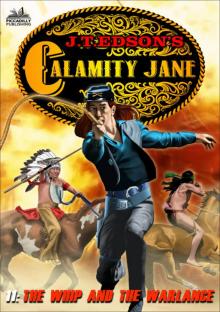 Calamity Jane 11
Calamity Jane 11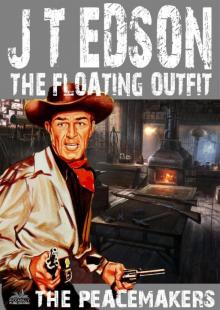 The Floating Outift 33
The Floating Outift 33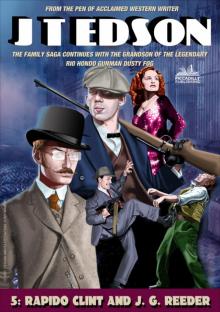 Cap Fog 5
Cap Fog 5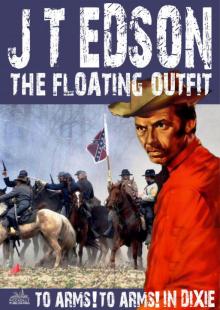 The Floating Outfit 34
The Floating Outfit 34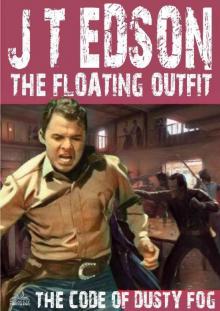 The Code of Dusty Fog
The Code of Dusty Fog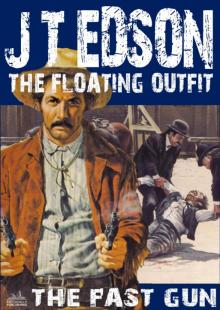 The Floating Outfit 21
The Floating Outfit 21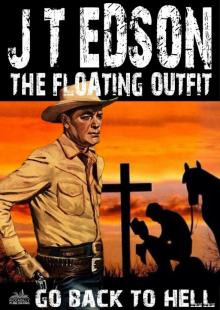 The Floating Outift 36
The Floating Outift 36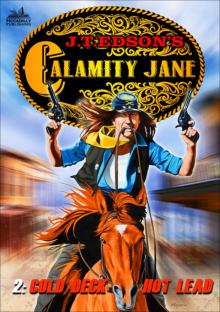 Calamity Jane 2
Calamity Jane 2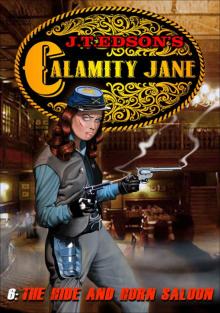 Calamity Jane 6: The Hide and Horn Saloon (A Calamity Jane Western)
Calamity Jane 6: The Hide and Horn Saloon (A Calamity Jane Western) Waco 7
Waco 7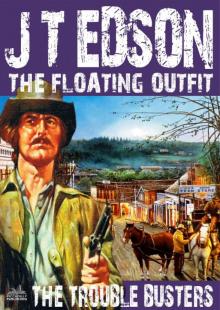 The Floating Outfit 25
The Floating Outfit 25 Waco 7: Hound Dog Man (A Waco Western)
Waco 7: Hound Dog Man (A Waco Western)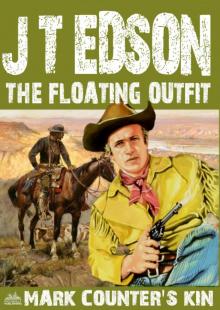 The Floating Outfit 47
The Floating Outfit 47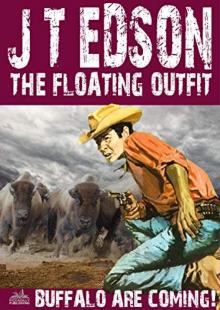 The Floating Outfit 42: Buffalo Are Coming!
The Floating Outfit 42: Buffalo Are Coming!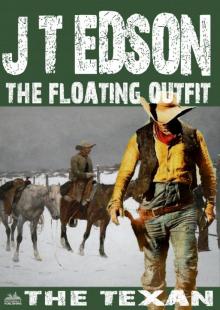 The Floating Outfit 46
The Floating Outfit 46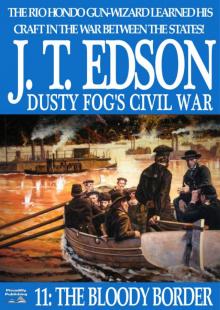 Dusty Fog's Civil War 11
Dusty Fog's Civil War 11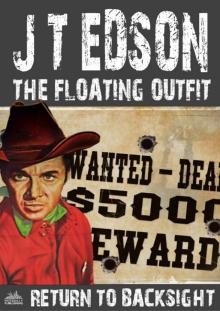 The Floating Outfit 61
The Floating Outfit 61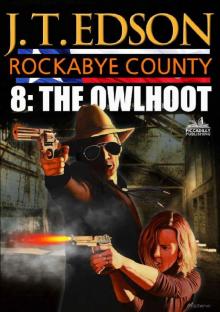 The Owlhoot
The Owlhoot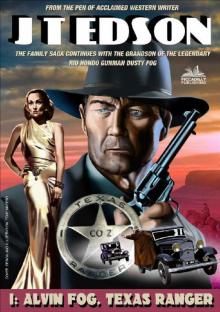 Alvin Fog, Texas Ranger
Alvin Fog, Texas Ranger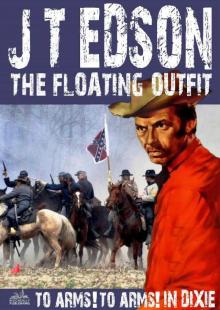 The Floating Outfit 34: To Arms! To Arms! In Dixie! (A Floating Outfit Western)
The Floating Outfit 34: To Arms! To Arms! In Dixie! (A Floating Outfit Western)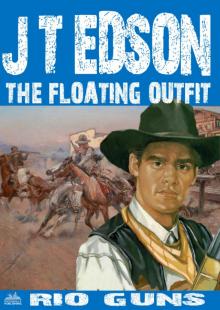 The Floating Outfit 44
The Floating Outfit 44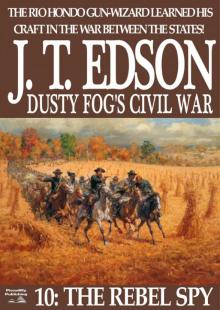 Dusty Fog's Civil War 10
Dusty Fog's Civil War 10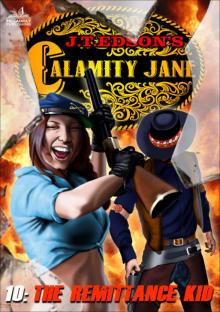 Calamity Jane 10
Calamity Jane 10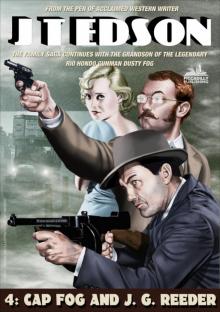 Cap Fog 4
Cap Fog 4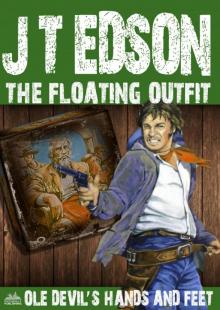 The Floating Outfit 51
The Floating Outfit 51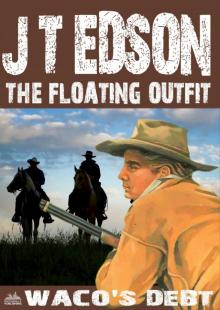 The Floating Outfit 50
The Floating Outfit 50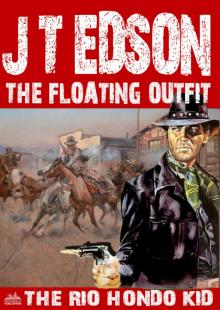 The Floating Outfit 49
The Floating Outfit 49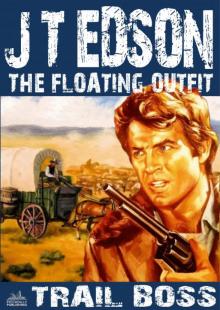 The Floating Outfit 10
The Floating Outfit 10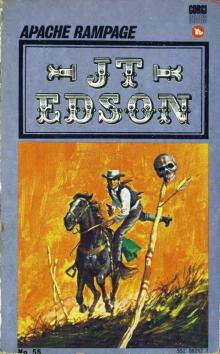 Apache Rampage
Apache Rampage The Floating Outfit 15
The Floating Outfit 15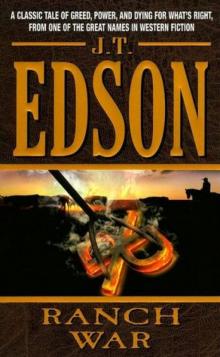 Ranch War
Ranch War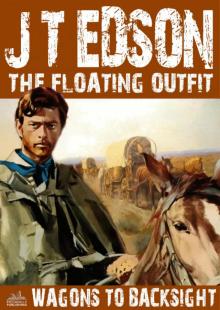 The Floating Outfit 11
The Floating Outfit 11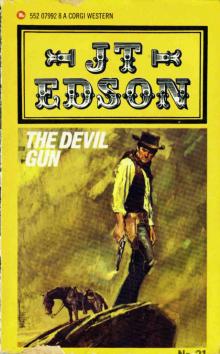 The Devil Gun
The Devil Gun Sacrifice for the Quagga God (A Bunduki Jungle Adventure Book 3)
Sacrifice for the Quagga God (A Bunduki Jungle Adventure Book 3) Comanche (A J.T. Edson Western Book 1)
Comanche (A J.T. Edson Western Book 1) The Floating Outfit 48
The Floating Outfit 48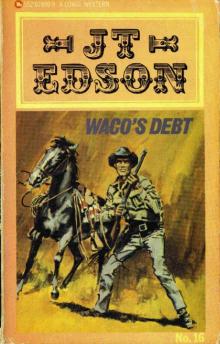 Wacos Debt
Wacos Debt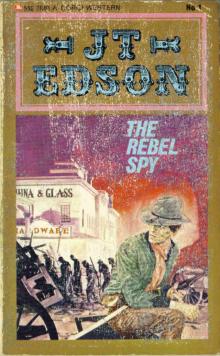 The Rebel Spy
The Rebel Spy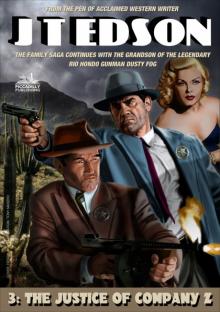 Cap Fog 3
Cap Fog 3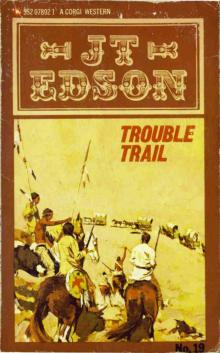 Trouble Trail
Trouble Trail Cold Deck, Hot Lead
Cold Deck, Hot Lead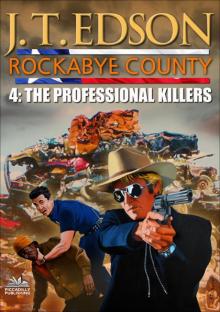 Rockabye County 4
Rockabye County 4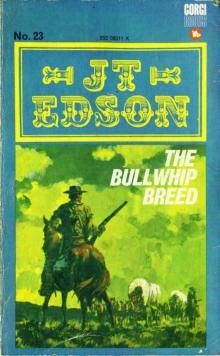 The Bullwhip Breed
The Bullwhip Breed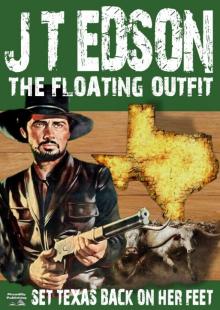 Set Texas Back On Her Feet (A Floating Outfit Western Book 6)
Set Texas Back On Her Feet (A Floating Outfit Western Book 6)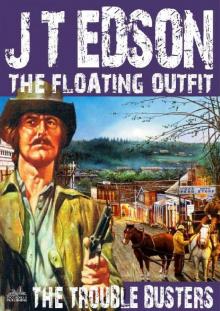 The Floating Outfit 25: The Trouble Busters (A Floating Outfit Western)
The Floating Outfit 25: The Trouble Busters (A Floating Outfit Western) Fearless Master of the Jungle (A Bunduki Jungle Adventure
Fearless Master of the Jungle (A Bunduki Jungle Adventure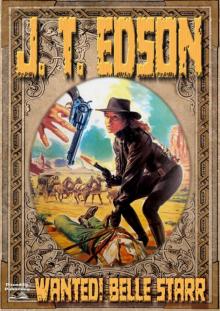 Wanted! Belle Starr!
Wanted! Belle Starr! The Big Hunt
The Big Hunt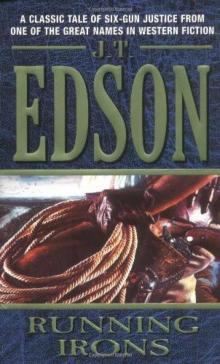 Running Irons
Running Irons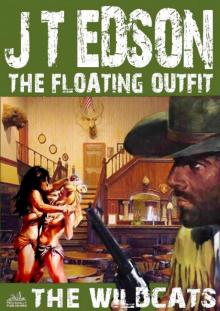 The Floating Outfit 19
The Floating Outfit 19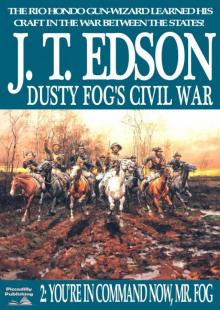 You're in Command Now, Mr Fog
You're in Command Now, Mr Fog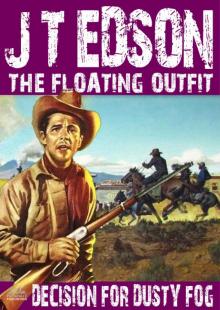 The Floating Outfit 27
The Floating Outfit 27 Texas Killers
Texas Killers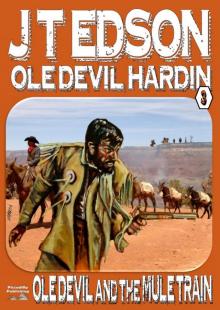 Ole Devil and the Mule Train (An Ole Devil Western Book 3)
Ole Devil and the Mule Train (An Ole Devil Western Book 3) Bunduki and Dawn (A Bunduki Jungle Adventure Book 2)
Bunduki and Dawn (A Bunduki Jungle Adventure Book 2)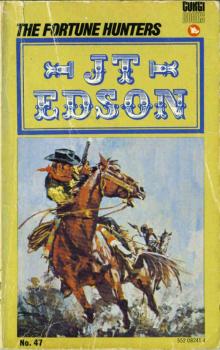 The Fortune Hunters
The Fortune Hunters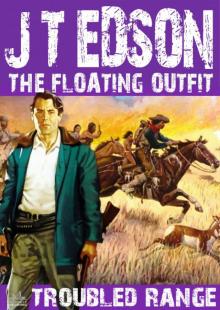 The Floating Outfit 12
The Floating Outfit 12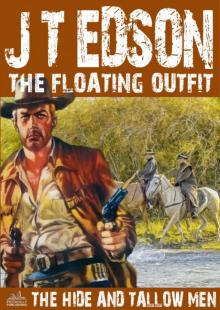 The Hide and Tallow Men (A Floating Outfit Western. Book 7)
The Hide and Tallow Men (A Floating Outfit Western. Book 7)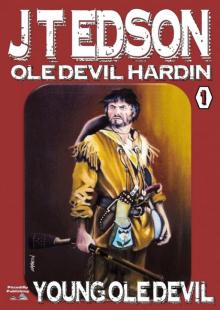 Young Ole Devil
Young Ole Devil Slip Gun
Slip Gun The Drifter
The Drifter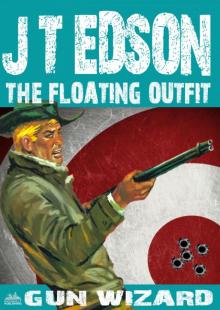 The Floating Outfit 45
The Floating Outfit 45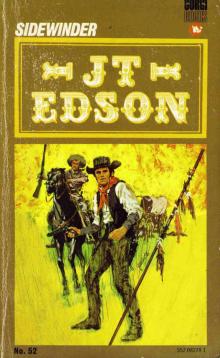 Sidewinder
Sidewinder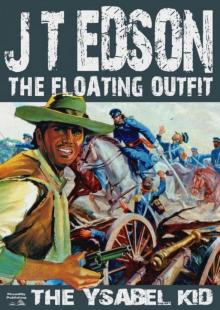 The Ysabel Kid
The Ysabel Kid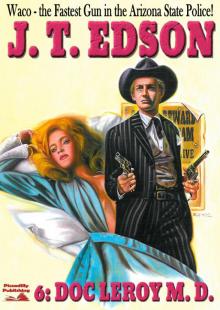 Waco 6
Waco 6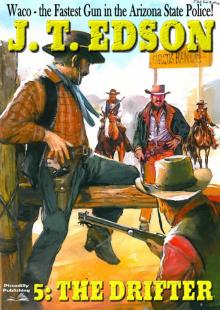 Waco 5
Waco 5 Point of Contact
Point of Contact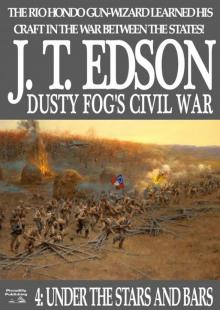 Under the Stars and Bars (A Dusty Fog Civil War Western Book 4)
Under the Stars and Bars (A Dusty Fog Civil War Western Book 4)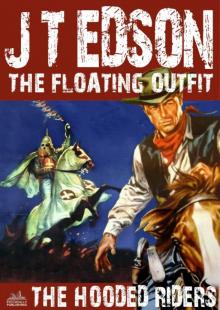 The Floating Outfit 9
The Floating Outfit 9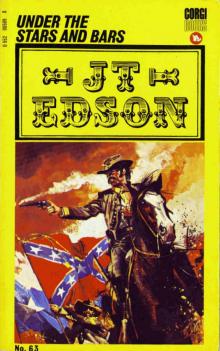 Under the Stars and Bars
Under the Stars and Bars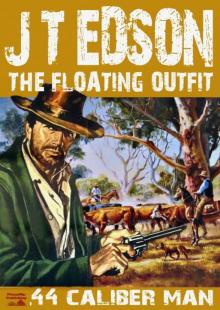 .44 Caliber Man
.44 Caliber Man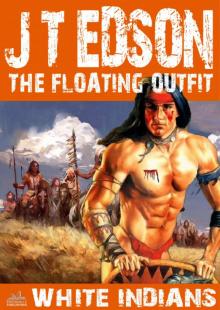 The Floating Outfit 17
The Floating Outfit 17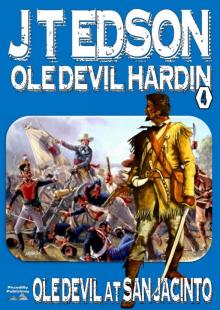 Ole Devil at San Jacinto (Old Devil Hardin Western Book 4)
Ole Devil at San Jacinto (Old Devil Hardin Western Book 4)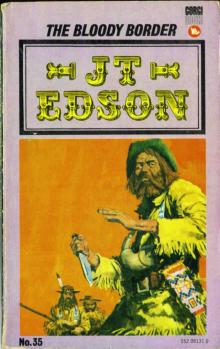 The Bloody Border
The Bloody Border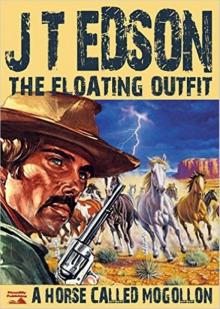 A Horse Called Mogollon (Floating Outfit Book 3)
A Horse Called Mogollon (Floating Outfit Book 3)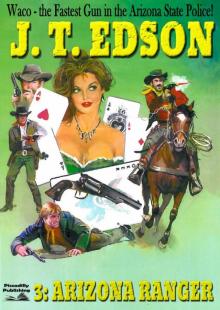 Waco 3
Waco 3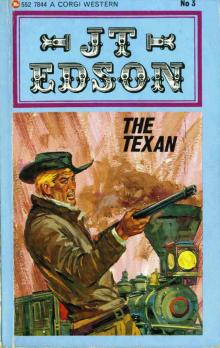 The Texan
The Texan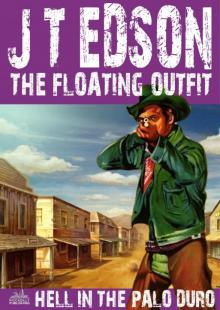 The Floating Outfit 35
The Floating Outfit 35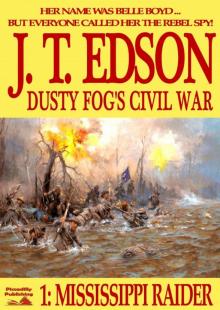 Mississippi Raider
Mississippi Raider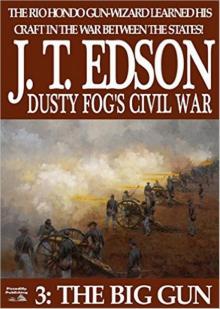 The Big Gun (Dusty Fog's Civil War Book 3)
The Big Gun (Dusty Fog's Civil War Book 3)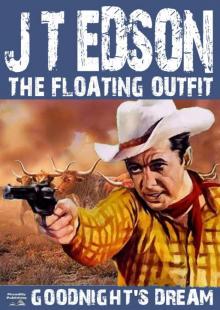 Goodnight's Dream (A Floating Outfit Western Book 4)
Goodnight's Dream (A Floating Outfit Western Book 4) Waco 4
Waco 4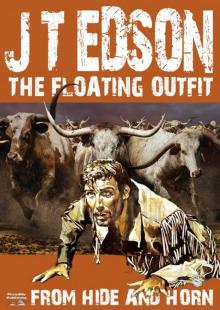 From Hide and Horn (A Floating Outfit Book Number 5)
From Hide and Horn (A Floating Outfit Book Number 5)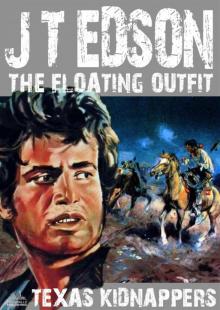 The Floating Outfit 18
The Floating Outfit 18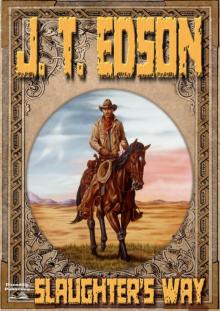 Slaughter's Way (A J.T. Edson Western)
Slaughter's Way (A J.T. Edson Western)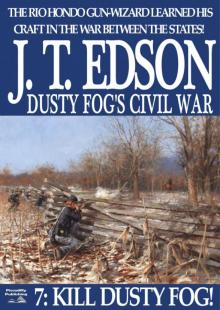 Dusty Fog's Civil War 7
Dusty Fog's Civil War 7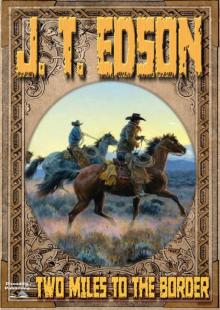 Two Miles to the Border (A J.T. Edson Western)
Two Miles to the Border (A J.T. Edson Western)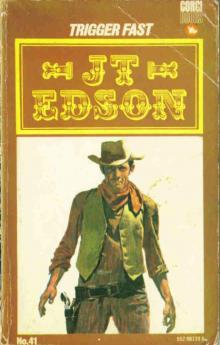 Trigger Fast
Trigger Fast Waco's Badge
Waco's Badge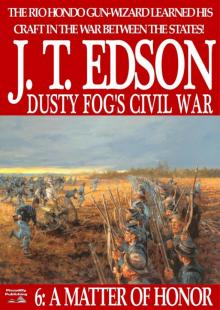 A Matter of Honor (Dusty Fog Civil War Book 6)
A Matter of Honor (Dusty Fog Civil War Book 6)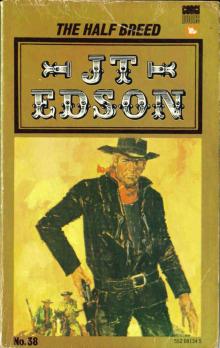 The Half Breed
The Half Breed Bunduki (Bunduki Series Book One)
Bunduki (Bunduki Series Book One)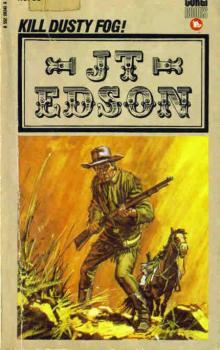 Kill Dusty Fog
Kill Dusty Fog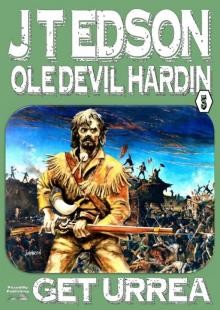 Get Urrea! (An Ole Devil Hardin Western Book 5)
Get Urrea! (An Ole Devil Hardin Western Book 5)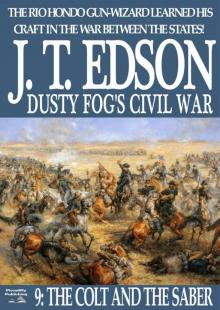 Dusty Fog's Civil War 9
Dusty Fog's Civil War 9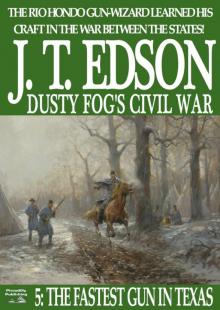 The Fastest Gun in Texas (A Dusty Fog Civil War Book 5)
The Fastest Gun in Texas (A Dusty Fog Civil War Book 5)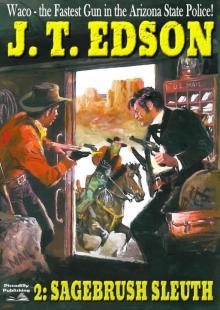 Sagebrush Sleuth (A Waco Western #2)
Sagebrush Sleuth (A Waco Western #2)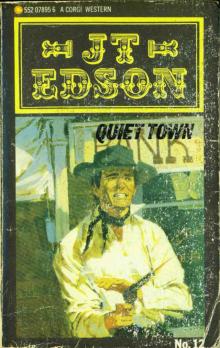 Quiet Town
Quiet Town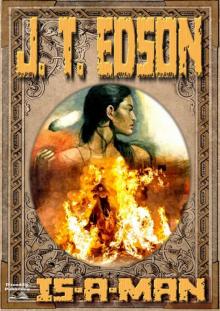 Is-A-Man (A J.T. Edson Standalone Western)
Is-A-Man (A J.T. Edson Standalone Western) Rockabye County 5
Rockabye County 5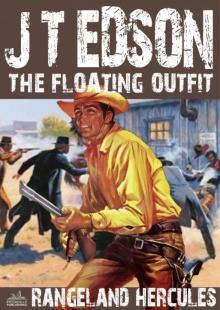 The Floating Outfit 14
The Floating Outfit 14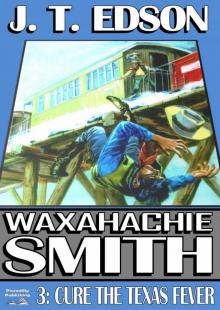 Cure the Texas Fever (A Waxahachie Smith Western--Book 3)
Cure the Texas Fever (A Waxahachie Smith Western--Book 3)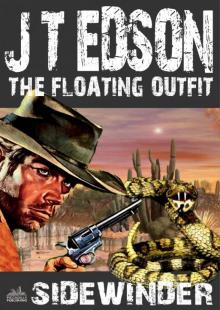 The Floating Outfit 13
The Floating Outfit 13 The Road to Ratchet Creek
The Road to Ratchet Creek